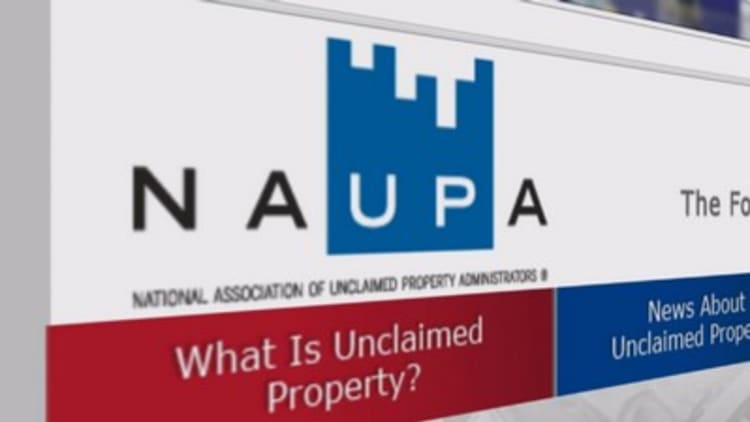
New Yorker Angela Silverstein became around $13,000 richer in a matter of about five minutes. Tax-free, and with no risk, either.
How? She was simply able to locate money that was owed to her but that had been missing for years — in one instance, decades.
According to the latest figures from the National Association of Unclaimed Property Administrators, more than $40 billion is sitting in state unclaimed property programs nationwide.
In New York alone, the state comptroller's office pays out about $1 million per day. There is no current data on the average daily payout across all U.S. state unclaimed funds offices, according to NAUPA.
The process of retrieving that money was surprisingly easy, said Silverstein.
New York State comptroller Thomas DiNapoli said that in many instances, people can get money back in a matter of days or sometimes weeks.
"Typically, it involves someone who has moved," said DiNapoli. "And the bank or the financial institution, the insurance company, the utility where there was a security deposit does not have the up-to-date contact information."
DiNapoli advises people to always make sure that when they move, they inform all of their financial relationships of their new contact information, including address and phone number.
Searching for missing money online is usually the best bet, either by going through the comptroller's website or a more general missing-money website where one can narrow down the location, based on state.
A Google search of the office of unclaimed funds for whichever state the individual resides will get one there, as well. The system will prompt a user for the information needed and can verify the connection to the account.
The main source of the funds is from banks. Banks are required to keep records over a certain number of years. However, when an account has been dormant for a certain period of time (the exact number of years varies depending on the bank), the institution is required under federal and state law to turn the money over to the state. That's so the state can return the funds to their rightful owner — if and when that person comes to claim it.
I would say the majority of my clients have found something lying out there in unclaimed property.Paul Schatzpresident of Connecticut-based investment advisory firm Heritage Capital
Most of Silverstein's findings were small commission checks, as well as utility refunds, a leasing refund and a dividend account she had a rollover from. She got the funds back tax-free — as is sometimes the case with unclaimed funds — because she had originally paid taxes on those portions of the monies that were taxable.
Financial advisors say it is a good idea to make a habit out of checking with state offices.
"I advise clients to check unclaimed property in their states every year to 18 months, as remnant passbook accounts and other accounts seem to be left behind," said Paul Schatz, president of Heritage Capital. "I think it's a good exercise."
"I would say the majority of my clients have found something lying out there in unclaimed property," he said.
While there are businesses that act as "finders" of unclaimed money for a fee (sometimes up to 15 percent), comptroller DiNapoli cautions people to ignore phone calls or letters from them, since there's no charge for going directly to his or other state offices to claim money. The New York comptroller's office told CNBC that these for-profit businesses know someone's owed money, because they've downloaded the free zipped file of claimants owed money, which is available on the state website.
Asked what she planned to do with her checks, Silverstein smiled. "It's not only found money, it's my found money," she said. "I think my grandson is gonna have one great birthday party."
More from Portfolio Perspective:
Preparing your portfolio for a Fed rate hike
Never heard of tax mapping? It will save you retirement dollars
Avoid these dangerous estate-planning errors





